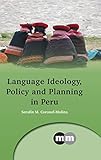Language Ideology, Policy and Planning in Peru / Serafín M. Coronel-Molina.
Material type: TextSeries: Multilingual MattersPublisher: Bristol ; Blue Ridge Summit : Multilingual Matters, [2015]Copyright date: ©2015Description: 1 online resourceContent type:
TextSeries: Multilingual MattersPublisher: Bristol ; Blue Ridge Summit : Multilingual Matters, [2015]Copyright date: ©2015Description: 1 online resourceContent type: - 9781783094240
- 9781783094257
- Language and culture -- Peru
- Language planning -- Peru
- Language policy -- Peru
- Sociolinguistics -- Peru
- LANGUAGE ARTS & DISCIPLINES / Linguistics / Sociolinguistics
- Endangered languages
- Ethnography
- High Academy of the Quechua Language
- Language academy
- Language ideology
- Language policy and planning
- Minority languages
- Quechua maintenance and revitalization
- 306.44/90985 23
- P119.32.P4 C67 2015
- P119.32.P4 C67 2015
- online - DeGruyter
- Issued also in print.
| Item type | Current library | Call number | URL | Status | Notes | Barcode | |
|---|---|---|---|---|---|---|---|
 eBook
eBook
|
Biblioteca "Angelicum" Pont. Univ. S.Tommaso d'Aquino Nuvola online | online - DeGruyter (Browse shelf(Opens below)) | Online access | Not for loan (Accesso limitato) | Accesso per gli utenti autorizzati / Access for authorized users | (dgr)9781783094257 |
Frontmatter -- Contents -- Figures and Tables -- Acknowledgments -- Foreword -- Part 1: Setting The Scene -- 1 Why Study a Language Academy? -- 2 Theoretical Paradigms: Dynamics of Language Change -- 3 What are Language Academies Good For? -- 4 Language Policy and Planning in Peru: A Brief History -- Part 2: High Academy of the Quechua Language: Foundations -- 5 Quest for Official Recognition -- 6 Anatomy of an Academy: Structure, Membership, Statutes -- Part 3: Inventing Tawantinsuyu and Qhapaq Simi: Ideologies of the HAQL -- 7 Imagining a 'Nation', Idealizing a Language -- 8 Constructing and Deconstructing Expertise -- 9 Allies or Enemies? Collaborating with the HAQL -- Part 4: Empowering Inca Quechua: Language Planning à la HAQL -- 10 Status Planning with the HAQL -- 11 Corpus Planning's Alphabet Wars: Quechua Graphization -- 12 Standardizing and Modernizing Quechua: An Ongoing Dilemma -- Part 5: Spreading the Language of the Apus: Acquisition Planning and Revitalization Struggles -- 13 Preparing for Pedagogy -- 14 Learning Quechua with the HAQL -- 15 Where Do We Go From Here? Final Thoughts and Recommendations -- Appendix 1: Log of Audio-Recorded Data -- Appendix 2: Publications Associated with the HAQL Related to Status, Corpus and Acquisition Planning -- References -- Index
restricted access online access with authorization star
http://purl.org/coar/access_right/c_16ec
This book explores the role of language academies in preserving and revitalizing minority or endangered languages. The author studies the controversial High Academy of the Quechua Language (HAQL) in Peru, the efficacy of which has been questioned by some experts. The book delves into the positions, attitudes, ideologies and practices of the HAQL and the role it has played in language policy and planning in the Andean region. The author uses ethnographic fieldwork to support what was previously only anecdotal evidence from individuals viewing the Academy from the outside. This book would appeal to anyone studying the sociolinguistics of the Quechua language, as well as to those studying broader issues of Indigenous language policy and planning, maintenance and revitalization.
Issued also in print.
Mode of access: Internet via World Wide Web.
In English.
Description based on online resource; title from PDF title page (publisher's Web site, viewed 24. Apr 2022)


